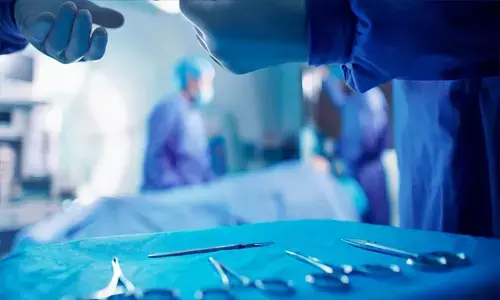- Home
- Medical news & Guidelines
- Anesthesiology
- Cardiology and CTVS
- Critical Care
- Dentistry
- Dermatology
- Diabetes and Endocrinology
- ENT
- Gastroenterology
- Medicine
- Nephrology
- Neurology
- Obstretics-Gynaecology
- Oncology
- Ophthalmology
- Orthopaedics
- Pediatrics-Neonatology
- Psychiatry
- Pulmonology
- Radiology
- Surgery
- Urology
- Laboratory Medicine
- Diet
- Nursing
- Paramedical
- Physiotherapy
- Health news
- Fact Check
- Bone Health Fact Check
- Brain Health Fact Check
- Cancer Related Fact Check
- Child Care Fact Check
- Dental and oral health fact check
- Diabetes and metabolic health fact check
- Diet and Nutrition Fact Check
- Eye and ENT Care Fact Check
- Fitness fact check
- Gut health fact check
- Heart health fact check
- Kidney health fact check
- Medical education fact check
- Men's health fact check
- Respiratory fact check
- Skin and hair care fact check
- Vaccine and Immunization fact check
- Women's health fact check
- AYUSH
- State News
- Andaman and Nicobar Islands
- Andhra Pradesh
- Arunachal Pradesh
- Assam
- Bihar
- Chandigarh
- Chattisgarh
- Dadra and Nagar Haveli
- Daman and Diu
- Delhi
- Goa
- Gujarat
- Haryana
- Himachal Pradesh
- Jammu & Kashmir
- Jharkhand
- Karnataka
- Kerala
- Ladakh
- Lakshadweep
- Madhya Pradesh
- Maharashtra
- Manipur
- Meghalaya
- Mizoram
- Nagaland
- Odisha
- Puducherry
- Punjab
- Rajasthan
- Sikkim
- Tamil Nadu
- Telangana
- Tripura
- Uttar Pradesh
- Uttrakhand
- West Bengal
- Medical Education
- Industry
Vitamin D deficiency tied to fistula development after reconstructive head and neck surgery: Study

USA: Patients with vitamin D deficiency are more likely to develop fistula following major head and neck surgery, a recent study in journal The Laryngoscope has revealed.
Vitamin D deficiency is a commonly observed health problem in the world and has been associated with many chronic diseases. The importance of vitamin D deficiency in anesthesia management is increased. Considering this John Symms, University of Arizona College of Medicine – Tucson, Tucson, Arizona, U.S.A., and colleagues aimed to investigate the association of vitamin D level and perioperative complications in patients undergoing major head and neck surgery in a retrospective cohort study.
The researchers performed a retrospective chart review for all patients undergoing reconstructive head and neck surgery between December 2017 and December 2019. Data regarding serum 25-hydroxyvitamin D (calcidiol) level, patient demographics, hospital course, prior radiation, and fistula formation were collected.
Patients with vitamin D levels <20 ng/mL were considered deficient and ≧20 ng/mL were considered sufficient and outcomes were compared between the groups.
Fifty-seven patients were included in the analysis. The average age at the time of surgery was 62.6 ± 10.6 years.
The research yielded the following findings:
- Individuals in the deficient group (n = 29) had a mean serum calcidiol level of 13.95 ± 3.95 ng/mL, whereas those in the sufficient group (n = 28) had a mean calcidiol level of 28.53 ± 5.73 ng/mL.
- The rate of fistula was 41.4% in the deficient group, whereas patients in the sufficient group had a rate of fistula of 14.3%.
- On multivariate analysis, higher serum calcidiol level above 20 ng/mL was associated with a lower likelihood of developing fistulae with an odds ratio 0.830.
"Our findings revealed that vitamin D deficiency may play a role in the development of fistula after major head and neck surgery," concluded the authors.
Reference:
The study titled, "Association of Perioperative Complications with Vitamin D Levels in Major Head and Neck Surgery," is published in The Laryngoscope.
DOI: https://onlinelibrary.wiley.com/doi/10.1002/lary.29776
Dr Kamal Kant Kohli-MBBS, DTCD- a chest specialist with more than 30 years of practice and a flair for writing clinical articles, Dr Kamal Kant Kohli joined Medical Dialogues as a Chief Editor of Medical News. Besides writing articles, as an editor, he proofreads and verifies all the medical content published on Medical Dialogues including those coming from journals, studies,medical conferences,guidelines etc. Email: drkohli@medicaldialogues.in. Contact no. 011-43720751


